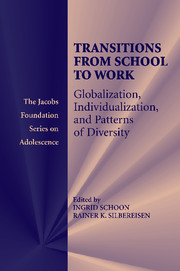Book contents
- Frontmatter
- Contents
- List of Illustrations
- List of Tables
- Contributors
- Acknowledgments
- I Introduction
- 1 Conceptualising School-to-Work Transitions in Context
- 2 Thinking about the Transition to Adulthood: From Grand Narratives to Useful Theories
- II Transitions and Global Change
- III Individual Decision Making
- IV Mapping Diversity and Change
- V Interventions and Policies
- Index
- References
1 - Conceptualising School-to-Work Transitions in Context
Published online by Cambridge University Press: 22 December 2009
- Frontmatter
- Contents
- List of Illustrations
- List of Tables
- Contributors
- Acknowledgments
- I Introduction
- 1 Conceptualising School-to-Work Transitions in Context
- 2 Thinking about the Transition to Adulthood: From Grand Narratives to Useful Theories
- II Transitions and Global Change
- III Individual Decision Making
- IV Mapping Diversity and Change
- V Interventions and Policies
- Index
- References
Summary
Introduction
The transition from school to work is one of the most crucial periods in the life of a young person. It generally spans the phase between completion of full-time education or training and entry into continuous full-time employment. It can be a very turbulent phase, involving various attempts and different routes trying to establish oneself in the labour market, or it can be a rather smooth transition. It involves a number of important decisions, such as whether to continue with further education or to leave school directly after completion of compulsory education; what type of job or career to choose; and how best to respond to opportunities and constraints in the labour market. Which path a young person takes during this transition period can have long-term consequences regarding his or her future career and subsequent working life but can also impact other interlinked transitions, such as leaving the parental home and taking the step into partnership and family formation.
Transition experiences are dependent on individual decision making but are also largely shaped by opportunities and constraints presented by the sociohistorical context and economic conditions. In the past four decades, employment opportunities in most Western countries have changed dramatically following the introduction of new technologies, the disappearance of manual jobs, and the increasing participation of women in the labour market. Compared to the early 1970s, unemployment rates in almost all developed countries have risen, especially in Europe (International Labour Organization, 2008; Müller & Gangl, 2003).
- Type
- Chapter
- Information
- Transitions from School to WorkGlobalization, Individualization, and Patterns of Diversity, pp. 3 - 29Publisher: Cambridge University PressPrint publication year: 2009
References
- 25
- Cited by

